|
|
|
Sort Order |
|
|
|
Items / Page
|
|
|
|
|
|
|
| Srl | Item |
| 1 |
ID:
180681


|
|
|
|
|
| Summary/Abstract |
This paper enquires into how effectively “regional transboundary water governance” functions in resolving ecological problems associated with shared water resources. It compares three cases in Asia—the Irtysh River, Aral Sea, and Mekong River basin. Previous scholarly work on the hydro-politics of these three cases within social science disciplines, especially political science and international relations, focuses heavily on the dimension of “hegemonic power disparity between state actors” (from the weaker parties’ points of view) and/or the “economic or strategic benefits of development either defending or criticizing” (from the more powerful—often the polluters’—point of view). To contribute to existing research, this paper intends to enlarge the analytical scope and use the formation of regional environmental governance to grasp a broader picture of the complexity and interconnectivity of ecological issues, regional history, and politics. For analysis, we investigated the multilevel gaps in environmental communication at three different levels, exploring both the conflictual and cooperative relationships amongst all actors involved, namely (a) state-to-state relations: hydro-hegemonism due to the power disparity in historical and political contexts; (b) society level: authoritarian environmentalism between politics and citizens; and (c) global inter-connectivity or distance from (or the absence of) the application of international norms. We argue that all three cases, albeit at various degrees, equally exhibit the potential to fill the multidimensional gaps to ensure more functional, effective, and equitable regional hydro-governance.
|
|
|
|
|
|
|
|
|
|
|
|
|
|
|
|
| 2 |
ID:
129411
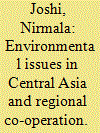

|
|
|
|
|
| Publication |
2014.
|
| Summary/Abstract |
Environmental security has become an integral component of human security. An ecological balance is essential for people to be able to lead a normal and a healthy life. Today the issue to lead a normal
life has acquired global significance and nations are discussing climate change, global warming and its likely impact on human beings, food security and biodiversity. In this regard the Central Asian States (CAS) are no exception. Since independence these States have been grappling with several issues of concerns to them. Among the environmental issues of Central Asia the most catastrophic one is the desiccation of the Aral Sea, which has now shrunk to dangerous proportions causing enormous socio-economic and health problems. At the crux of this issue is water and its inefficient management. Water management problems are also at the centre of regional politics and tensions. The Aral Sea basin encompasses all the CAS and Afghanistan. A solution to this grave problem has to be, therefore, found in a collective and a collaborative manner before it becomes worse. Is such a co-operation possible? The article examines the status of the Aral Sea and explores the possibility of a cooperative approach.
|
|
|
|
|
|
|
|
|
|
|
|
|
|
|
|
| 3 |
ID:
134128
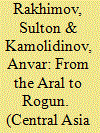

|
|
|
|
|
| Publication |
2014.
|
| Summary/Abstract |
Recently, the problems related to water usage in the Central Asia Region have not left the pages of the media and Internet websites. Particular attention is being focused on the most urgent topic-building hydropower stations on the upper reaches of the Amu Darya and Syr Darya rivers, which are the region's main water arteries.
This article presents an analysis of the water situation in the Amu Darya Basin, including the reasons for the shrinkage of the Aral Sea. It draws a picture of how water resources form, are distributed, and used in the Amu Darya Basin, and gives probable forecasts of the potential positive and negative consequences of building the Rogun Hydropower Plant, keeping in mind the influence of the current global challenges and threats for the region. It draws attention to the weak regional cooperation and the possible development of negative trends caused by limited integration. The difficulties associated with stable water supply to the region's countries can only be avoided by establishing cooperation among them
|
|
|
|
|
|
|
|
|
|
|
|
|
|
|
|
| 4 |
ID:
002294
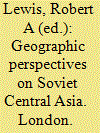

|
|
|
|
|
| Publication |
London, Routledge, 1992.
|
| Description |
xv, 323p, figures,maps,tablesHbk
|
| Series |
Studies of the Harriman Institute Series
|
| Contents |
Includes Index.
|
| Standard Number |
0415075920
|
|
|
|
|
|
|
|
|
|
|
|
Copies: C:1/I:0,R:0,Q:0
Circulation
| Accession# | Call# | Current Location | Status | Policy | Location |
| 033656 | 911.47/LEW 033656 | Main | On Shelf | General | |
|
|
|
|
| 5 |
ID:
159561
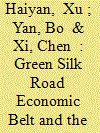

|
|
|
|
|
| Summary/Abstract |
Central Asia has a fragile ecological environment. In particular, one of the most challenging environmental concerns in the region is the Aral Sea crisis. Despite the global attention received on the governance of the Aral Sea, the crisis remains unresolved. This article presents a novel conceptual framework and dynamic model for the governance of the Aral Sea. The authors suggest that a key aspect of agricultural modernisation in Central Asia should entail returning water to the Aral Sea to gradually ease the Aral Sea crisis. The authors argue that China's recent proposal to construct a Silk Road Economic Belt provides an opportunity for initiating effective water governance of the Aral Sea, as corroborated in their framework and model. The authors recommend the development of a "green Silk Road Economic Zone" as a cooperative and sustainable joint initiative of the countries concerned that would benefit Central Asia and China, as well as the Aral Sea.
|
|
|
|
|
|
|
|
|
|
|
|
|
|
|
|
| 6 |
ID:
088929


|
|
|
|
|
| Publication |
2009.
|
| Summary/Abstract |
The La Plata River Basin in South America, whose waters are shared by Argentina, Bolivia, Brazil, Paraguay and Uruguay, provides important lessons from the long history of negotiations over its shared water and other natural resources. In particular, innovative resource management practices developed over time have led to the relative harmony in which the riparian countries coexist. In this article, we analyze negotiation techniques within the La Plata River Basin by examining in detail the processes leading to the two seminal agreements - the 1969 Treaty of La Plata Basin and the 1979 Itaipú-Corpus Agreement. Based upon our analysis of the complex and often contradictory relationships between the riparian states, we evaluate the outcomes of both treaties from the standpoint of cooperation in the region and sustainable development. In doing so, we extend the relevance of the analysis to other basins with similar issues of regional management. The article extends the basin cooperation, through negotiation, to include trade agreements and development via project partnerships that draw in regional and global actors, including non-governmental organizations, environmental lobbies in foreign countries, and multinational development banks. The above actors are relevant for many parts of the world in today's era of globalization.
|
|
|
|
|
|
|
|
|
|
|
|
|
|
|
|
| 7 |
ID:
087681
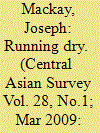

|
|
|
|
|
| Publication |
2009.
|
| Summary/Abstract |
The Aral Sea disaster is the result of Soviet-era irrigation policy. The collapse of the Soviet Union left the issue under the purview of international law. This essay addresses how this shift has affected attempts to slow or reverse the sea's depletion. Treaties on the non-navigation use of international watercourses and on the prevention of desertification have had little effect. While a number of regional instruments and arrangements have been brought to bear, they have also done little to reverse damage to the sea. Finally, attempts to regulate the issue through domestic law, as evidenced in the case of Kyrgyzstan, have done little as well. While some progress has recently been made under the auspices of the World Bank, it is not a result of international law. The conclusion is that the shift from domestic to international law has little improved the situation, and may have made matters worse.
|
|
|
|
|
|
|
|
|
|
|
|
|
|
|
|
| 8 |
ID:
128952
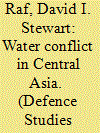

|
|
|
|
|
| Publication |
2014.
|
| Summary/Abstract |
There are conflicting views as to whether water scarcity will lead to cooperation or conflict. The central thesis of this paper is that conflict over water scarcity only becomes likely when it causes an existential threat to a population or state. The paper identifies a requirement for a new definition of the most severe levels of water scarcity in response to the concept of virtual water and proposes a new definition for absolute water scarcity based upon the presence of an existential threat to a population. Using the principles identified from a review of the water conflict debate and the new definition, the paper examines two Central Asian case studies to gauge the likelihood of conflict. In the case of the Aral Sea it concludes that regional geopolitics, assisted by international organisations should be able to find a compromise. In the case of Kazakhstan's Ili and Irtysh Rivers it takes the view that water scarcity, demographics and geopolitics are likely to cause China to export its insecurity to other nations. In so doing it may cause conflict that should be a concern to the UK and other nations.
|
|
|
|
|
|
|
|
|
|
|
|
|
|
|
|
|
|
|
|
|